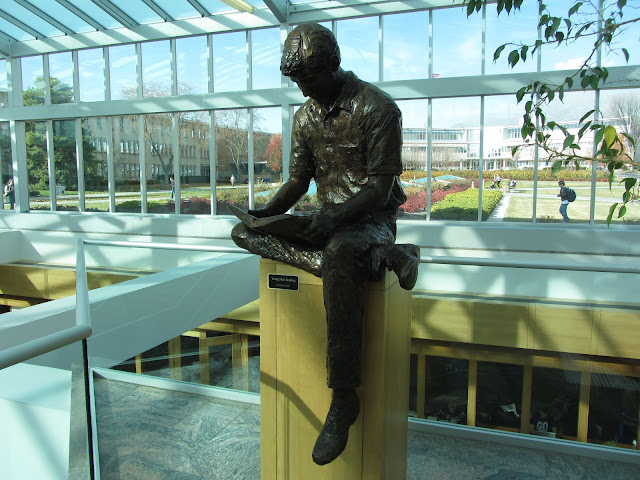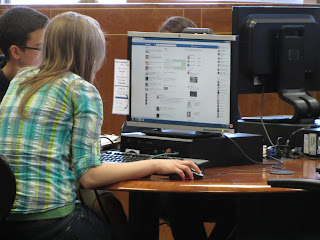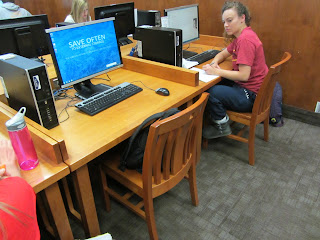There's a distinct difference between ordering a product from amazon and buying it from a crowded retail store-- one has shipping costs, the other has a line. Why is that?
Imagine an amazon where rather than pay for shipping, products would wait in a queue. A quick supply and demand graph gives us some insight. Figure 1 is an estimate for the Kindle Fire:
 |
| Fig. 1 |
A Demand curve is essentially a representation of the population and how much they value-- in this case-- the kindle fire. At a price of $168, consumers who value the product at equal to or more than $168 will purchase it, while those who value it at less than $168 will not. Notice how that area changes in Figure 2, where shipping costs are removed, thereby reducing the overall price.
 |
| Fig. 2 |
Where 6.5 million Kindle fires were demanded before, now 8 million are demanded at the price of $144. The problem is that Amazon is less willing to sell Kindle Fires if they're making less money, and will now only supply 5 million to the market.
This leaves an imbalance in supply and demand, and results in a shortage-- 3 million people who want the product will not be able to get it. To solve this crisis, people will inevitably default to 'first come, first served'-- buy a Kindle Fire as soon as possible, because once they run out, you can't get one. No matter how much the market demands, it can only purchase as much as is supplied, so where 6.5 million Kindle Fires were bought and sold in the first scenario, only 5 million are bought and sold in the second.
In the case where shipping is *free*- nice as that sounds- it causes inefficiency in the marketplace.
Let's take an example closer to home. Well, my home anyway.
 |
| A scholarly statue at the entrance of the BYU library. |
The BYU library-- one of the largest in the collegiate world.
In this library, as is typical with most, the ground level features a vast array of computers at which students may sit and use any time of the day.
Free of charge.
The result? See for yourself.
 |
| On the right, a man with urgent business scours the room for an available computer-- nowhere to be found. |
On ground level, all computers are in use at all times. More computers litter the basement floor, and the scene is no different. What's more, numerous students are constantly patrolling in the background, waiting patiently for a computer that takes an average of 7 minutes to become available!
With no price attached to computer usage, students have defaulted to a first come, first served system- and the demand is staggering. Those that want to use one of the 60 operating machines will lurk like predators, carefully defining their territory to prevent competitors from beating them to a spot that opens up. Each time a student decides finally to let go of his computer, three desperate people in the vicinity rush briskly to the chair, sitting as quickly as possible to prevent interference. Like savages they rely on brute strength, physical speed and territorial cunning to determine the victor in a race to free stuff.
At a first glance, this might not seem like such a bad thing. After all, we are using all the computers, right? Doesn't that mean we're being efficient?
The answer is a resounding no, for a few simple reasons.
1. Computers are often not allocated to the right people.
 |
| Some spend their time... |
Fact is, some people are going to benefit more from the use of a computer than others. If Jimmy wanders in and sits down at the last available computer to browse Facebook, George is out of luck with his last-minute physics assignment when he runs into the room with but a prayer. It's obvious that with one computer remaining, it would be best served going to George, but because Jimmy strolled in a minute earlier, it goes to him instead.
 |
| ...better than others. |
George may then wait patiently, only to have Freddy enter the room-- another Facebook-browser. Freddy is the BYU track team superstar, specialized in the 100 meter dash. With his free time he practices the martial arts, and has the highest known rank in Brazilian Jiujitsu. George and Freddy stand nearby until Jimmy finally gets up to leave-- and Freddy's incredible speed along with a well-placed stiff arm secures his position at the instantly-retaken computer. Once again, a higher net benefit would be obtained if the seat was secured by George, but rather than allocate based on this sort of importance, the computer is allocated based on the irrelevant factor of foot-speed.
Many students, myself included, own a laptop but prefer the use of a desktop computer. I'll use my macbook and be perfectly content, but the added utility of a mouse and a nice big screen is to my liking. When it comes to the library, a comfortable padded chair is also somewhat preferred to the wooden benches that line the walls-- so even when my portable computer is readily available, I'll often take a seat at a desktop if I get lucky with timing and walk in on one unused.
 |
| An excellent blog-- that I could easily browse on my laptop. |
2. People spend a longer-than-optimal amount of time at their computer.
After all, if it's free for as long as I use it, why would I get up? Oftentimes, a person may sit down to finish a dire assignment, but may find that with time to spare they might as well surf the web- check their Facebook and email. Rather than use the computers efficiently, people will linger on until their marginal benefit from the next minute of computer use is less than the virtually zero marginal cost, and for people without too much else to do, that can be a long time. Looking over shoulders indicates that much, if not most, of the time people spend on the computers is doing trivial activities out of having nothing better to do, even as people with a desperate need stand by on the sidelines.
Like I said before-- with 60 machines in the room, the average wait time during the busier hours is an astounding 7 minutes. With multiple people waiting on the computers, if you're not fast, it could easily mean 15 minutes of anxiously standing around.
3. Seat-savers.
With no cost attached to holding onto your seat, it turns out that not all the computers even *are* being used. If someone has to make a bathroom run in the middle of writing their essay, simply leaving the computer logged in with a nearby backpack signals a "saved seat" that no one is allowed to touch.
For obvious reasons, this is a disastrous waste of the computer. Furthermore, whoever leaves with a seat-saver has no incentive to carry out their business quickly and rush back so as to efficiently spend time. The computer will be waiting for them all the same.
The Solution
Pricing.
In this instance, pricing could be applied in two ways. The simplest is to attach a price/hour to use of the computers, and use the revenue gained to reducing students' tuition. This means students as a whole are paying no more for their college experience than they used to, with costs being associated to those who take most advantage of the scarce resources BYU has to offer. It would encourage students to spend their time wisely, and wrap up their assignments quickly. Facebook users would be reduced to only those who were in *daring* need of checking their Facebook (in which case, all power to them), and seat-savers would either forget the practice or make their seat saving as short as possible.
The other option, perhaps more interesting, is to have the students do the exchanging with each other. Each computer could have a tall rod above the screen that holds an index card. After sitting down at a computer, a student would simply write down a dollar value, on a card, that he or she would be willing to accept in exchange for use of the computer. Students that walk in could then scan the room for a low-enough price that they are willing to pay, and give that money to the computer's user in order to trade places. Waiting around would be futile, and no one would bother doing it, since the only time a computer would open up is when someone else is taking it for money-- this because there is value in use of the computer. As with the pricing system described above, this solves the problem of allocating computers to the wrong people, because if you value the computer less than I do, I'll pay you to get off. Dispassionate Facebook users will throw up very low prices that homework-doers will readily accept, thereby ensuring that those who value the computers most will have use of them as needed. Only in the instance that everyone else in the room at their respective computers values their usage more than you do, will you walk in deciding not to pay for the use of a computer-- and rightly so.
The main advantage I see to the second system is removing the BYU administration from the picture, which would likely reduce transaction costs. On the other hand, since everyone will be forced off their computers when the library closes, the beginning of each day would remain a first come, first serve dash to grab a seat-- only reverting to a more sensible pricing once the system gets going.
Either way, these systems are both far more efficient than that which is currently in place.


I love this post! It would be interesting to contemplate others types of currency in these scenarios. When you talk about having things cost--we automatically think of money transactions, but many things are more effectively regulated by benefits and punishments that have nothing to do with money. Like when you give up your seat on an airplane you get a free ticket for another day. Maybe computer seats could be like that.
ReplyDeleteThis is an excellent point-- the main advantage to money is that no one has a hard time getting it, and everybody likes it, but in the case of BYU students they may choose not to carry it around. Nothing on the top of my head strikes me as a better form of payment, but I'll give it some thought. Thank you!
ReplyDeleteThere are all sorts of other ways. For instance with the card method, one could hold up a sign with $0.35 and a bowl of Luck Charms, or a banana.
DeleteThat's certainly true. People could pretty easily barter, especially since we're all college students with fairly similar tastes, and a love for food.
DeleteI'm glad you re-visited this post because I think I made another potential answer to this question in my most recent post "A Closer Look at Micro-economies." Provided the students can actually invent their own form money for this purpose, it could be managed in a way that's more convenient. Once again, I'm not really sure what that might be - I'd have to examine this particular case a little closer. The potential advantage is if they fit in a wallet easily and were matched pretty evenly in value with the use of a computer. That way nobody's carrying around pocket change.